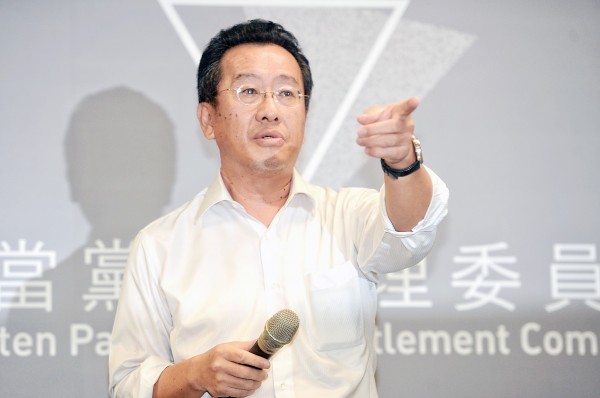《TAIPEI TIMES》 Koo vows ‘differentiated’ style

Ill-gotten Party Assets Settlement Committee Chairman Wellington Koo speaks at a news conference in Taipei yesterday, commenting on his new post as chairman of the Financial Supervisory Commission. Photo: Lin Cheng-kung, Taipei Times
TOP OF THE AGENDA: The FSC chairman-designate said his first task in his new job would be to familiarize himself with the tasks of all the agencies under the commission
By Sean Lin / Staff reporter
Financial Supervisory Commission (FSC) chairman-designate Wellington Koo (顧立雄) yesterday addressed doubts over his abilities to prevail in his new post, while vowing to implement a “differentiated management style” and to seek to achieve a balance between encouraging innovation in the financial sector and regulating it.
Koo yesterday fielded reporters’ queries at the offices of the Ill-gotten Party Assets Settlement Committee in Taipei, which he has headed since September last year.
Asked how he would balance regulating the financial sector and encouraging innovation, Koo said he would consult his new colleagues over the implementation of a “differentiated management style” at financial institutions within the legal parameters of the financial innovations and experiments bill, which is being reviewed by the legislature.
Any person appointed FSC chairman in the digital age must consider how to balance innovation and regulation, but also contemplate whether to segregate industry and the financial sector, and prevent firms from being controlled by a handful of families, Koo said.
Koo said he envisions a “differentiated management style” whereby financial institutes are graded by their performance on internal controls, internal audits and legal compliance, with the grades serving as a reference when the commission decides how much freedom to grant the institutions to experiment with innovative services.
Institutions with good records would likely be granted more freedom to experiment with higher-risk financial services, while those with poor showings would likely be granted limited freedom to experiment, he said.
“Hopefully, by implementing a differentiated management style, it will encourage financial institutions seeking innovation to boost their scores for internal controls, internal audits and legal compliance,” he said.
Another major challenge is how to reasonably allow technology firms to offer services traditionally offered by banks, such as handling funds or offering loans, while protecting the safety of consumers, as the technology and financial sectors are interconnected, he said, adding that a more sound solution to the issue would present itself after the bill is passed by the legislature.
Other items on his agenda include discussing with the Insurance Bureau how to encourage firms to direct some of their funds to local innovative sectors, as well as consulting with the Securities and Futures Bureau and the Taiwan Stock Exchange over how to revitalize the local bourse in the wake of the Ministry of Finance’s plan to separate business income tax and individual income tax, Koo said.
Koo said that he does not have a candidate in mind for FSC vice chairman, likely meaning that existing FSC vice chairmen Cheng Cheng-mount (鄭貞茂) and Huang Tien-mu (黃天牧) would likely remain in their posts.
Asked what motivated him to accept President Tsai Ing-wen’s (蔡英文) and premier-designate William Lai’s (賴清德) invitation to take up the post after it was reported that his wife, Vice Minister of Economic Affairs Wang Mei-hua (王美花), was “shocked” by the appointment, Koo, a lawyer, said it was due to encouragement he received from vice premier-designate Shih Jun-ji (施俊吉) and his friends in the legal sector.
Koo said that his friends told him that as a financial regulator, one had better not be a person of interest in the financial sector and that he had best keep the sector “at arm’s length,” so that he can impartially enforce the regulations.
Shih said that he thought it was ideal for a person with legal background to assume the post, Koo said.
“I hope he [Shih] takes responsibility for his words,” Koo added.
Chinese Nationalist Party (KMT) Vice Chairman Hau Lung-bin (郝龍斌) said that Koo’s ideology would make him the Democratic Progressive Party’s “imperial guard” of the financial sector, while KMT Central Standing Committee member Sean Lien (連勝文) said the appointment amounted to “pork barrel politics.”
Koo dismissed the remarks as baseless accusations.
“At this moment, it is impossible for me to tell you whether I will do well,” Koo said, asking people to give him time.
He said the first thing he would do after taking the post tomorrow would be to familiarize himself with the tasks of all the agencies under the commission.
新聞來源:TAIPEI TIMES
















